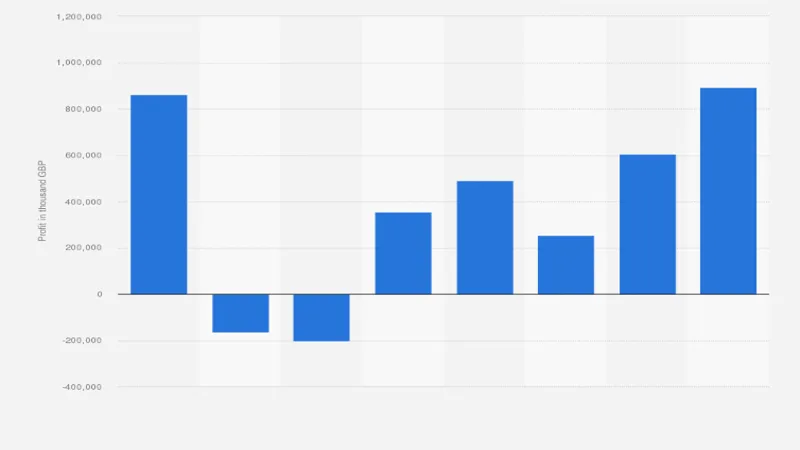In a remarkable turnaround, International Airlines Group (IAG), the parent company of British Airways, is set to unveil a substantial increase in annual profits, driven by surging travel demand and a decline in fuel costs. As the aviation industry gradually recovers from pandemic-induced challenges, IAG’s upcoming financial results, expected on February 28, promise to highlight a 15% profit surge, equating to an impressive $4.3 billion. This optimistic outlook reflects not only the growing number of travelers but also strategic advancements in operational efficiency, even amidst potential hurdles that could impact future growth. With the travel sector gaining momentum, IAG’s performance will be closely watched by investors and analysts alike.
| Category | Details |
|---|---|
| Parent Company | International Airlines Group (IAG) |
| Subsidiary Airlines | British Airways (BA), Iberia (IB), Vueling (VY), Aer Lingus (EI) |
| Expected Profit Increase | 15% increase to $4.3 billion |
| Total Revenue | 31.7 billion euros (£26.3 billion) |
| Load Factor | 89.9% |
| Fuel Costs Change | 4.2% decrease due to fuel-efficient aircraft |
| Challenges Faced | Potential slower growth in bookings and loyalty program changes |
| Recent Stock Performance | Stock has doubled in the past year |
| Market Analyst Insight | Strong travel industry supports IAG’s growth despite risks |
A Promising Financial Outlook for IAG
International Airlines Group (IAG) is set to announce a remarkable increase in profits, estimated at 15%, amounting to $4.3 billion. This growth is largely attributed to the rising demand for air travel, as more people are eager to explore new places and reconnect with loved ones. Lower fuel costs have also played a vital role, allowing IAG to maximize its earnings while providing affordable ticket prices for travelers.
With a total revenue increase to 31.7 billion euros (£26.3 billion), IAG’s positive financial performance is a sign of recovery in the airline industry. Despite facing challenges like flight disruptions, the company’s high load factor of 89.9% indicates that most flights are full. This means more passengers are flying, which is great news for IAG and the entire aviation sector!
The Impact of Fuel Prices on Airline Profits
Fuel costs are a significant part of running an airline, similar to how gas affects car travel. Recently, IAG has benefitted from a 4.2% drop in fuel costs, which has helped boost their profits. With more fuel-efficient aircraft in their fleet, the company can save more money, allowing them to invest in better services and cheaper fares for passengers.
The decrease in fuel prices is a double-edged sword. While it helps airlines like IAG save money, it also raises questions about how long these savings will last. If fuel prices rise again, it could affect ticket prices and airline profits. Therefore, IAG’s ability to manage fuel expenses will be crucial for its future success.
Challenges Ahead for British Airways
Despite the positive outlook, IAG faces some challenges, particularly with British Airways (BA). Recently, the German travel operator Tui raised concerns about slower booking growth for summer travel. This news suggests that while demand is currently high, future travel plans may not be as strong, putting pressure on BA to attract more customers.
Additionally, changes to BA’s loyalty program have caused a stir among frequent flyers. By shifting from a distance-based points system to a revenue-based model, many loyal customers feel their benefits have been reduced. This backlash could impact customer loyalty, which is essential for maintaining a stable revenue stream, especially during uncertain times.
Investor Confidence in the Airline Sector
Despite the challenges facing IAG and British Airways, investor confidence remains high. IAG’s stock has doubled in the past year, indicating that many believe in the airline’s future success. Market analysts view the overall strength of the travel industry as a crucial factor supporting IAG’s growth, making it an attractive option for investors.
Investor confidence is vital for IAG as it enables the company to continue expanding and improving its services. With a strong performance in the past year, IAG is well-positioned to navigate challenges while still appealing to travelers looking for quality air travel options.
The Role of Customer Loyalty in Aviation
Customer loyalty is incredibly important in the airline industry. Airlines like British Airways rely on frequent flyers who often choose their services for travel. Changes to loyalty programs can greatly impact how customers feel about an airline, and BA’s recent shift to a revenue-based model has faced criticism from loyal customers who feel their rewards have diminished.
Maintaining a loyal customer base is crucial for airlines, especially during challenging times. If BA can address the concerns of its frequent flyers and find ways to improve its loyalty program, it may strengthen its relationship with travelers and boost overall sales in the future.
Looking Ahead: The Future of Air Travel
As the travel industry continues to recover, the future of air travel looks promising. With increasing demand for flights and a focus on sustainability, airlines are adapting to new trends. IAG is investing in more fuel-efficient aircraft and enhancing customer experiences, which will likely attract more travelers.
However, airlines must remain vigilant about potential challenges, such as fluctuating fuel prices and customer satisfaction. By staying proactive and responsive to market changes, IAG can maintain its position as a leader in the aviation industry, ensuring that passengers continue to enjoy safe and affordable travel options.
Frequently Asked Questions
What is International Airlines Group (IAG)?
International Airlines Group (IAG) is the parent company of British Airways, Iberia, Vueling, and Aer Lingus, managing multiple airlines under one umbrella.
Why is IAG’s profit increasing?
IAG’s profit is increasing due to high travel demand and lower fuel costs, leading to a projected 15% rise in annual profits.
What are IAG’s expected profits for this year?
IAG is expected to announce annual profits of $4.3 billion, reflecting strong financial growth despite industry challenges.
What is the load factor for IAG flights?
IAG’s load factor, which measures flight occupancy, was reported at 89.9%, indicating that most flights are full.
What recent changes have affected British Airways’ loyalty program?
British Airways changed its loyalty program from distance-based to revenue-based points, which has upset many frequent flyers.
What challenges does IAG face moving forward?
IAG may face challenges such as slower growth in bookings and potential reputational risks due to changes in their loyalty program.
How has IAG’s stock performed recently?
IAG’s stock has doubled in the past year, reflecting strong investor confidence in the airline industry.
Summary
British Airways’ parent company, International Airlines Group (IAG), is set to report a significant profit increase of 15%, totaling $4.3 billion, thanks to high travel demand and lower fuel costs. Their revenue has risen to 31.7 billion euros, as more people travel despite some flight disruptions. IAG’s load factor is a strong 89.9%, reflecting high occupancy in flights. However, concerns about slower booking growth for summer and criticism over changes to BA’s loyalty program could pose challenges. Despite this, IAG’s stock has doubled, showing strong investor confidence in the airline industry.


